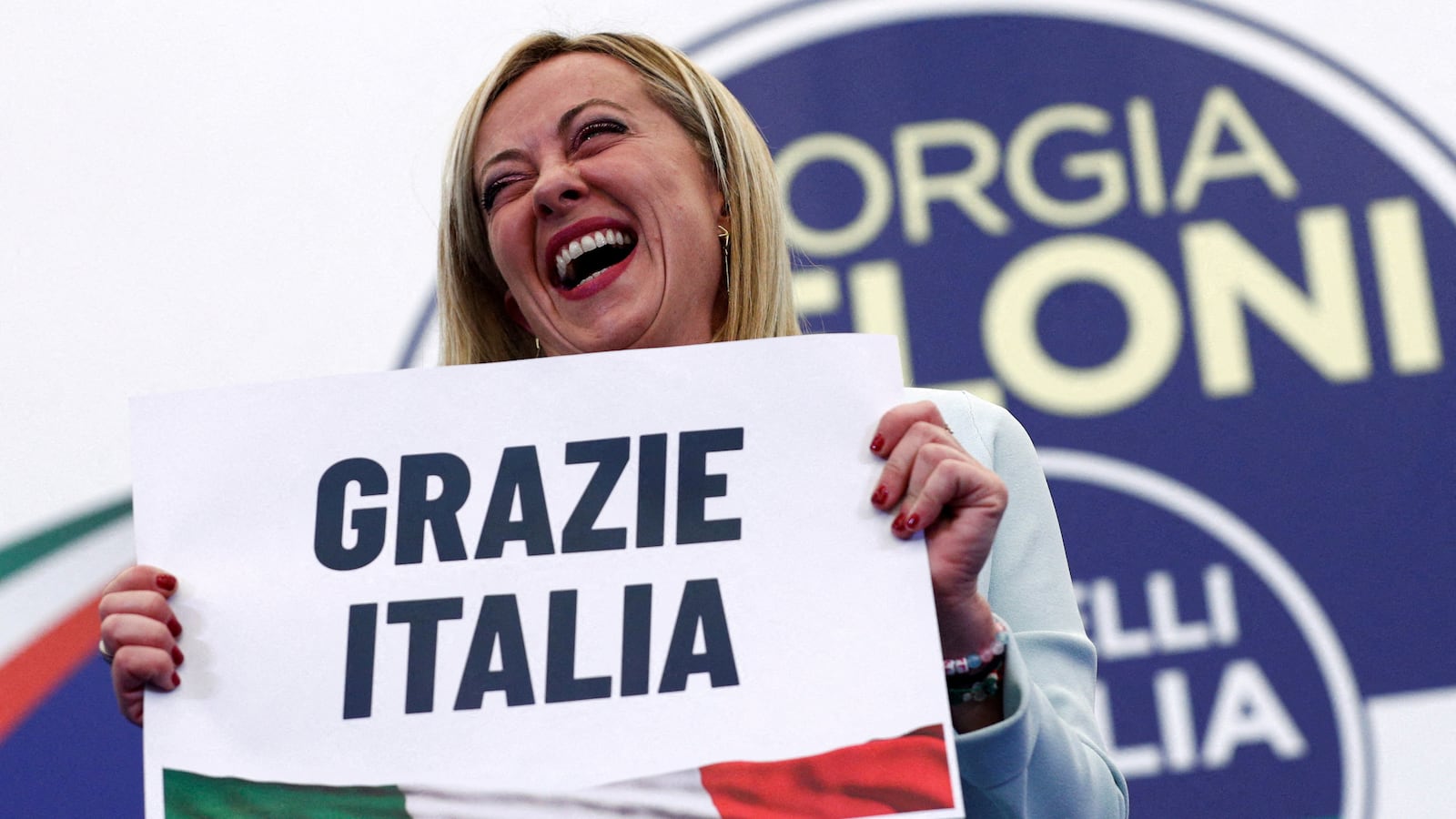The morning that more than 25 percent of Italian voters decided they wanted a woman to lead them, that woman—Giorgia Meloni—posted a video on her social media holding two melons more or less in front of her breasts with a wink and a smirk.
That the 45-year-old Roman native, whose last name in Italian indeed means “melons,” chose to start election day with that photo was nowhere near the most controversial part of her campaign. Nor is the fact that her party has shortened the timeframe for legal abortion—which she refers to as a tragedy—from nine weeks to seven weeks in the Italian regions they govern. Or that she seeks to re-examine the legality of same-sex unions and same-sex adoption.
It could be argued that her biggest affront is joining a coalition with Silvio Berlusconi, who has singlehandedly done more to hurt any hope of equality and empowerment in Italy than any other person. As prime minister, he once pleaded with foreign firms to invest in Italy because the country had such “beautiful secretaries.”
As the head of the Mediaset empire, his television programming has for years been akin to soft porn, creating the “velina” or showgirl, which more than half of young girls in Italian public schools aspire to become, according to a recent poll. He has been convicted of paying an underage exotic dancer for sex, and is infamous for his bunga bunga parties where pole dancers writhed on his cronies.
That Italy ranks 27th out of 27 countries in the European Union for gender parity for the World Economic Forum despite having among the most educated women in Europe is telling and largely blamed on Berlusconi’s media, which normalized sexploitation for the last 40 years.
But also telling is the high rate of domestic violence and femicide—the latest figures show one woman is killed by a man she thought loved her every three days.
Meloni is often referred to as a single mother, which she is, and which makes no difference to her political acumen. But that she has also anchored her campaign on the “traditional family” has raised eyebrows. Her 6-year-old daughter’s father, who she is romantically involved with, is a Mediaset journalist who lives in Milan. When asked once how she can pitch for a traditional family when her own is not, she simply said, “we are a man and a woman.”
Yet, Meloni has been embraced. Hillary Clinton, perhaps unaware of her domestic agenda, was among the first to tweet support, writing. “The election of the first woman prime minister in a country always represents a break with the past, and that is certainly a good thing.”
But so was Marine Le Pen, the French far-right politician whose own political feelings about gender equality lack a certain modernity.
Meloni, who started her political career in the neo-Fascist Italian Social Movement party, which was dissolved when it became illegal to embrace the ideals of Benito Mussolini, recently tweeted an anti-immigration video of an African migrant allegedly raping a Ukrainian refugee on a street.
That she did not think that posting a video that clearly showed the victim’s face was in breech of a certain ethical concern for privacy is important to note. Twitter removed the tone-deaf tweet and Meloni unapologetically said she was only doing it to show Italy needed to beef up security. The victim spoke out against Meloni, saying that being exposed made her “desperate” and that the video only added to her misery.
Italy is often referred to as a land that feminism forgot, and Meloni as the first female prime minister may well be the most fitting. “Being a woman doesn’t automatically mean being feminist,” Italian journalist Giulia Siviero told openDemocracy recently. “Arguing that a woman—any woman—winning [an election] is a conquest for all women and for feminism is very sexist to me, because it puts the sex before the person and her beliefs or policies.”
A childhood friend of Meloni, who doesn’t want to be named, told The Daily Beast that the reason she posted the melon video was an inside joke, and that after having spent years ridiculed for her last name, it was somewhat of a “last laugh” against those who bullied her. And Meloni was criticized in the past for promoting women to the upper echelons of her Brothers of Italy party she founded. So much so that several men changed party alliances for discrimination.
Italy is an unarguably patriarchal society in which 40 percent of women with children do not work outside the home, and, as such, a female leader will undoubtedly be judged differently than a male. Only time will tell if she does better or keeps the status quo.







